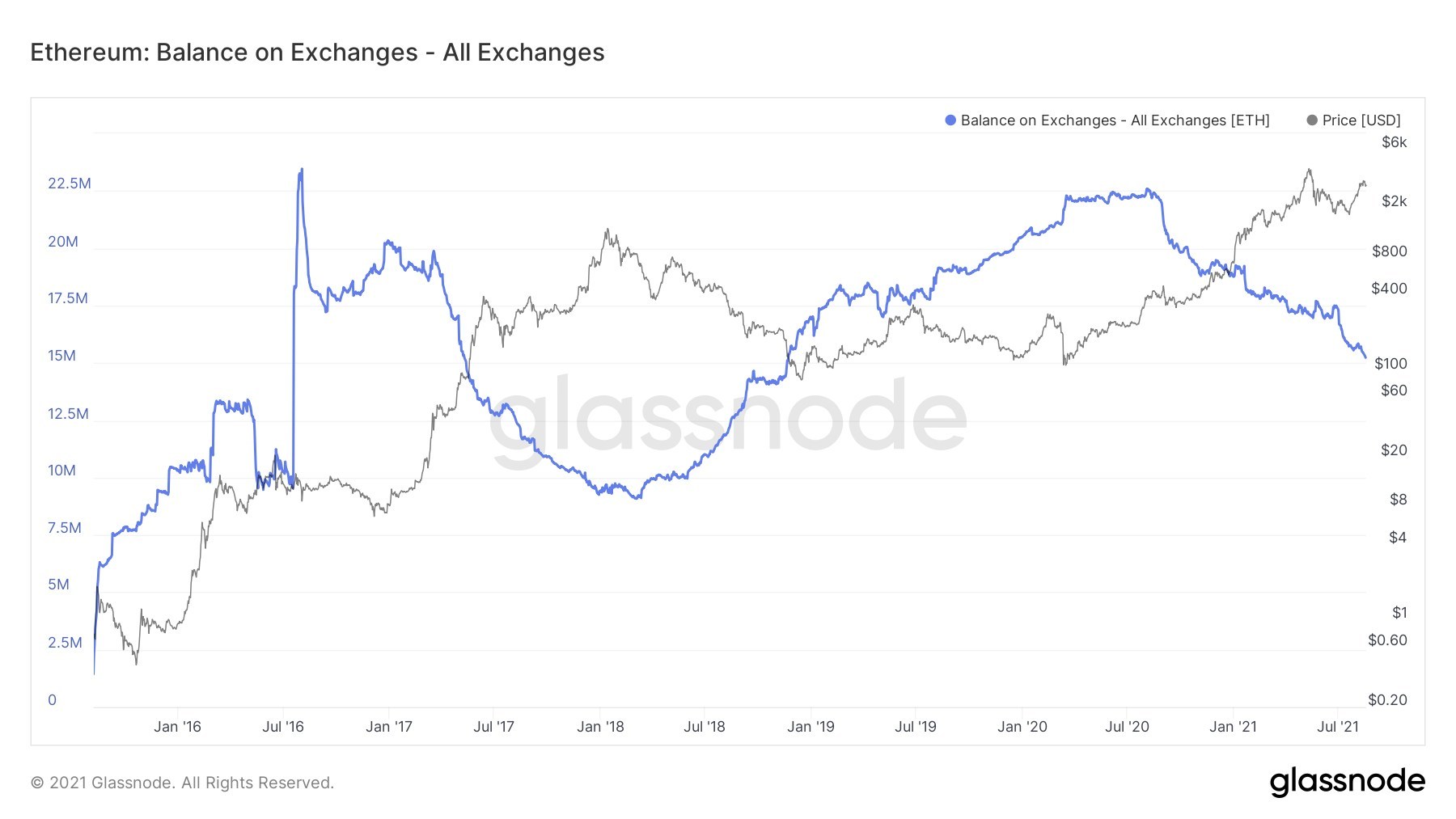Benzinga, a fintech media company providing news and data to retail investors and business lovers, has published its latest data study on the state of the Ethereum Network.
August 19, 2021
by Bezinga
Since the successful London hard fork on August 5th, 2021, a significant portion of the gas fees paid by Ethereum users are being burned. In only 2 weeks, 64,000 ETH has already been removed from existence forever according to watchtheburn.com. At current prices of around $3,000 per token, nearly $100,000,000 worth of Ether has come out of circulation each week.

Supply of ETH held on Exchanges. Source: Glassnode
Not only did EIP-1559 change the Ethereum protocol’s fee model, but it proved to the world that the Ethereum ecosystem is capable of making significant upgrades to its network. In the world of decentralized blockchains, this is a big deal.
What’s more, the amount of Ethereum available on exchanges has dwindled to a 2-year low after decreasing steadily for the last 12 months, according to data from blockchain analytics firm Glassnode.
The above chart overlays Ethereum’s price (charted in grey) and the amount of ETH held on exchanges (charted in blue). Since August 2020, the amount of Ether held on exchanges has decreased from 20 million tokens to 15 million, roughly a 25% decrease in exchange supply.
If Ether isn’t held on an exchange, it’s likely in a personal Ethereum wallet or locked in a smart contract.
Smart contracts are pieces of code that execute financial functions on the blockchain; funds are deposited into smart contracts for escrow, liquidity, staking, collateral and a host of other application specific reasons.
The chart above shows the percent of Ethereum’s supply in smart contracts in blue, and the price of Ether in grey. As shown above, the supply of Ether in smart contracts sharply increased in the summer of 2020, known among the community as “DeFi summer”. This was when DeFi applications 1st began to gain traction, including popular protocols such as Uniswap, Aave and yearn.finance.
Implications of Ethereum’s London Hard Fork
Pulling off a hard fork requires large scale organization. A hard fork is any upgrade that is backwards incompatible with the previous version of the protocol. To pull this off successfully, the Ethereum community had to cross their fingers that thousands of miners, node operators, exchanges and wallets would all upgrade their software simultaneously.
Almost magically, the new version of the Ethereum protocol containing EIP-1559 was adopted by over 80% of the community at 8:34 AM ET on August 5, 2021, preventing the chain from splitting in two.
This level of coordination excites Etherians faced with an even bigger challenge down the road, EIP-3675 (Ethereum 2.0). While fee burning is a huge part of the Ethereum 2.0 upgrade, the biggest challenge will be changing the consensus model from proof of work to proof of stake. This is what is planned for EIP-3675, an improvement that will immediately obsolete the insanely expensive graphics cards and computers dedicated to validating Ethereum’s current proof of work blockchain.
Instead of computing mathematical puzzles to secure the network, proof of stake employs validators who collateralize ETH for the right to secure the network. To incentivize validators to stake their ETH, validators earn the network fees associated with the transactions they help to facilitate. However, they are at risk of having their collateral slashed if they misbehave. This way, only honest behavior is rewarded and the protocol can theoretically operate trustlessly at scale.
The proof of stake consensus model was developed after the launch of Ethereum, and is the primary model used by smart contract blockchains created since then. By avoiding these mathematical problems, the energy consumption of the Ethereum network could be reduced by over 99.99%. While it behooves miners to sell ETH to buy more equipment, stakers are naturally incentivized to lock up more and more coins, reducing sell side pressure.

